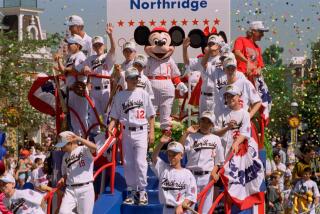A MINOR HAPPENING : Farm Team in Durham, N.C. Cultivates Success
- Share via
DURHAM, N.C. — The rain had fallen heavily most of the day, but by 6:30 p.m.--an hour before game time--a large crowd had formed outside Durham Athletic Park, and a gray-haired woman shook the padlocked gate and called out good-naturedly, “Come on, Miles. Open up. It’s time to play ball.”
Miles Wolff, owner of America’s most famous minor league baseball team, stood on the other side of the fence, near the souvenir stand, and watched as an attendant unlocked the gate to a chorus of cheers. Soon another capacity crowd of 5,000 was stuffed into the rickety, half-century-old park, and the Durham Bulls--of baseball and movie fame--went to work with joyous, unbridled expressions of adulation riding on every pitch.
The marriage of the Bulls and this old tobacco town is of particular note because for years, Durham didn’t give a hoot about baseball. In fact, so few fans turned out in 1971 that the team took out a newspaper ad at season’s end that read: “Final game of long, disastrous, just plain awful season.”
Then the club packed up and moved to Burlington, N.C.
Durham was without professional baseball until 1980, when Wolff brought a Carolina League expansion franchise for $10,000 and, against the advice of just about everyone, struck out for Durham. The Bulls are valued at several million dollars today and outdraw all but a few of the 150 minor league clubs across the country.
“It’s difficult to explain what happened except to say everything just clicked for us,” Wolff said. “The crowds are so big that I’m trying to cut back on our promotions. And the movie? Everyone asks about that. Sure, it helped, but we were drawing well long before it was released.”
The movie, of course, was “Bull Durham,” and it was in this downtown ballpark full of nooks and crannies and odd angles, where a brick tobacco warehouse stands behind right field and the parking lot holds hardly 100 cars because people once walked to afternoon baseball games, that aging catcher Crash Davis (Kevin Costner) and youthful fireballer Nuke LaLoosh (Tim Robbins) and Annie Savoy (Susan Sarandon) played out “a major league love story in a minor league town.”
For Wolff, the biggest impact of the movie, written and directed by former minor leaguer Ron Shelton of Los Angeles, was to give Durham a Bullomania cult following that resulted in a financial bonanza at the concession stands. Orders for Bulls’ souvenirs--everything from jackets to helmets to baseball cards--pour into the team’s office daily in response to national ads, and local business is so brisk the Bulls have opened an outlet in a Durham shopping mall.
Wolff also publishes “Baseball America,” a twice-monthly newspaper devoted primarily to the minor leagues, and its sales, too, are booming.
The Bulls are hardly the only team benefiting in the summer of ’89 from baseball’s renewed popularity. From San Bernardino to Richmond, from Billings, Mont., in the Pioneer League to Bluefield, W. Va., in the Appalachian League, minor league baseball--the professional training ground for major league stardom and wealth--is enjoying prosperity not seen in more than three decades.
Last year the minors drew a 36-year high of 21 million spectators. (The major leagues drew 53 million.) The Buffalo Bisons alone, in the American Assn., played before 1.1 million fans, outdrawing three major league clubs.
More than 30 new minor league stadiums have been built in the last decade, and teams such as the El Paso Diablos, which sold for $1 in the 1970s, are now valued in the millions. Towns from Oceanside, Calif., to Pueblo, Colo., to Macon, Ga., are lined up, trying to attract minor league franchises.
“I’ve been to games in Baltimore and Atlanta, and I can tell you, there’s nothing like the minors,” said Tinker Parnell, a retired Durham surveyor who has been to so many Bull games in the last 46 years that his grandstand seat is known as Tinker’s Corner.
“The atmosphere’s different here,” he said. “You’re close to the game. Everyone’s friendly. The kids on the field always say hi to you. They aren’t rich and spoiled like in the majors.”
The Bulls’ second baseman, 25-year-old Dave Butts, tends to agree.
“If you can’t be in the majors, there’s no better place to play than Durham, with the big crowds pumping you up,” he said.
But Butts, who, like his teammates, is under contract to the Atlanta Braves, has a good incentive to want out as he advances toward the majors: In the Carolina League, a player’s salary is about $1,200 a month; in the majors, the average monthly paycheck totals nearly $90,000.
More to Read
Go beyond the scoreboard
Get the latest on L.A.'s teams in the daily Sports Report newsletter.
You may occasionally receive promotional content from the Los Angeles Times.










